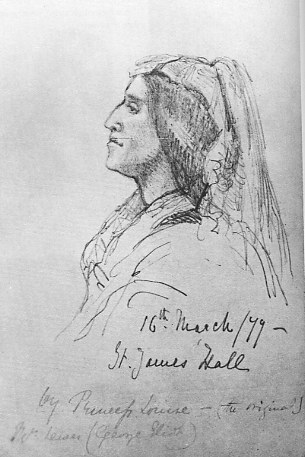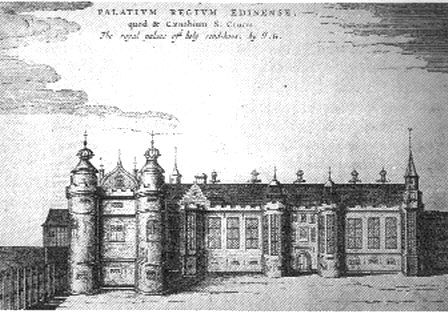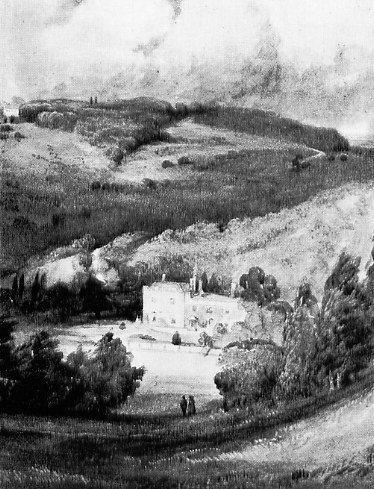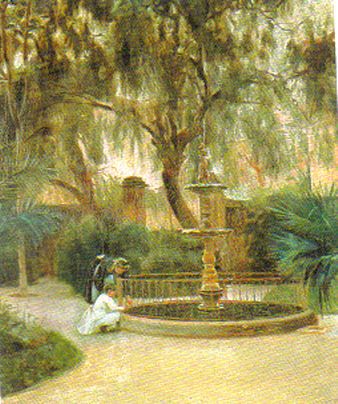Ellen and Jim Have a Blog, Too
We are two part-time academics. Ellen teaches in the English department and Jim in the IT program at George Mason University.


Women writers at the MLA, 2007 · 13 January 08
Dear Harriet,
What unites the papers I describe in this second letter on this year’s MLA is they were generally excellent and written as part of or in reaction to about 25 years of candid politics in literary studies.
I begin with the last session on the Victorian age I went to: 8:30 am Sunday morning, “George Eliot Biography: 40 Years since Haight.” William Baker, a much-respected Eliot scholar made this a particularly enjoyable panel. I had gotten there early and the people there all seemed to know one another and were talking and I was left out; he was kind enough to ask my name and interest, and then make efforts to enable me to join the conversation. He said goodbye to me when I left! He was without false pretension and so friendly to every one. I’ve read Gordon Haight’s biography and found myself in agreement with all the panelists who seemed to think even if Haight has some old-fashioned ideas about women and sexuality, nothing comes near his work in quality, knowledge, and interest. Baker talked about problems editing and publishing his edition of the letters by Eliot and Lewes which have emerged since the publication of Haight’s multi-volume edition. He spoke of how Yale is no longer interested in publishing high standard unabridged scholarly editions of Victorian correspondence (Yale did not attempt to purchase the library of Haight after his widow died). He also described how differently such editions are done today: in the case of Wilkie Collins, a team of scholars gets together, and online communication is essential.
For me the interest in all three papers was that they went over different aspects of the history of George Eliot’s biography. Who wrote the original memoirs (e.g., the woman who loved her & wrote an autobiography, Edith Simcox, gathered much material), where each writer got his materials from (Cross from Isaac Evans, Eliot’s narrow-minded mean brother), the use of novels, influence of rival contemporaries (Eliza Lynn Lynton’s bitter surmizes, and the way biographies turn documents, fact, and legends into myths which then influence the way we read Eliot’s novels and see Lewes’s work too. For example, Kathleen McCormack talked about the story that John Cross jumped out a window in Venice during his and Eliot’s honeymoon: she didn’t say it didn’t happen, but rather that so much rumor and lurid surmize has surrounded the incident, it’s really impossible to know exactly what did happen. Nancy Henley questioned the conventional way G. H. Lewes’s decision not to divorce his wife and marry Mary Ann Evans (aka George Eliot), suggesting that Lewes could have gotten a divorce from his wife even though he signed the birth certificate of a son who was probably not his, and that this is given as a sole and sufficient reason in order to whitewash Lewes’s motives.

George Eliot, 16 March 1877, Sketch by Princess Louise
Beyond Eliot, I went to three more sessions on women writers. The first was among the first sessions given, “New Modernist Studies and Virginia Woolf” (3:30, Thursday). Three papers which contextualized Woolf’s work by the new modernist studies. Sanja Bahun used statistic surveys to try to demonstate that nowadays readers read Woolf’s work not as narrowly English, but rather as having a global reach. Madelyn Detoff argued the fate of Woolf studies depends far more on the status of humanities studies (which are increasingly marginalized) than any new modernist approach (e.g, the tendency to study multiple authors, the demand for a global, anti-elistist, and subversive content. She thought Woolf speaks to us most immediately in her anti-war writing: Woolf for example says university education teaches competition, and far from discouraging war, enforces adaptation to the status quo. Joanne E. Grant’s paper was a reading of Orlando as a Sapphist or lesbian work.
At the end of the session, Mark Hussey, the panel chair, said he had arranged the session to try to bring out how now that deconstructionism & feminism were being dismissed Virginia Woolf seems to be disappearing from modernist studies once again, turned into a minor provincially English, elitist, and narrow (woman-centered, writing women’s novels) writer.
Although nothing terribly original or earth-shaking said, the session was lively, relevant, and the papers analyzed & defended studying Woolf in terms she would have appreciated: feminist, woman-centered, poetic and progressive. I cannot say the same for the other two sessions on women writers I went to. A session on “Reading 17th Century Genders in the 21st Century” (3:30 pm, Saturday afternoon) had three papers which looked for masculinist values and conventional political ways of thought in women autobiographers. Mihoko Suzuki teased Anne Bradstreet’s use of (nowadays) esoteric stories in the Bible to produce attitudes towards public politics. Thomas Luxon demonstrated 17th century documentable attitudes towards marriage in several authors (e.g., Montaigne, Milton) precluded looking at marriage as an egalitarian friendship and not at all to anticipate modern desires for same-sex marriage. What else is new? Erin Murphy’s interesting paper billed as about Lucy Hutchinson’s interest in war analyzed Hutchinson’s life of the Colonel to show she was undergoing a crisis of identity. She made the important observation that we must take women’s experience of political violence into account when we think of their lives. But she did not document how this experience can be shown to be prevalent in their writing. (Early modern women rarely depict themselves at risk from violence for that would be to lower their status and throw doubt on their chastity.)

Holyrood Palace, 1640s, before it was burnt down by English troops after the battle of Dunbar (c. 1650)
The discussion afterwards was bedevilled because an (apparently well-known) male scholar of in 17th century civil war studies persisted in accusing the panelists of ignoring the civil war in their papers (not true, & asked in a mischievous tone) and the session ended in defensive responses. The problem in this session and the other I attended on early modern women writers seemed to be that feminism is not just on the defensive but even erasing itself.
For “Medieval Feminst Scholarship” (7:15 pm, Saturday evening), the chair received papers which showed women writers mirroring male ideals for women. One excellent paper by Jessica Thomas, “Reading (and) Feminine Roles: Margaret Paston as Wife, Mother and Advisor” reminded me the best scholarship in the past 10 years on Renaissance women’s letters. Ms Thomas looked into who exactly wrote Paston’s letters (she dictated them all to 29 different servants & it’s not clear she could read) and gave many details about Paston as a submissive wife, ambitious mother, and aggressive state manager. Stephanie Morley’s study of Lady Margaret Beaufort’s translations, and Daisy Delogu’s study of Christine de Pizan’s translations of didactic political tracts on and by males produced high-minded, studious, & personalityless women who repeated what upper class males would say they approve of.
Unsurprizingly, the tone in the discussion afterwards was also defensive. I saw this retreat and defensiveness in Victorian sessions. In one an Eliot woman scholar of real renown said she was tired of hearing how George Eliot punished her heroines for having sex outside marriage and betrayed her women readers with her ideals of self-abnegation and she couldn’t see what that had to do with reading Eliot’s books. If we are no longer interested in what these women have to say to us that’s unique to them, meaningful and true to really lived women’s lives, why read them?
I went to two eigheenth-century sessions. One was on teaching the eighteenth century and although amusing and instructive (!), I didn’t take any notes. The second, Saturday night, at 9:00 pm, only had two speakers, and I was not able to follow one of them very well (it was very late at night), but I’d like to mention David Brewer’s “Resonance and Form: or, All Novels are Equal, but Some Novels are More Equal Than Others.” He argued for the importance of continuing to study the few massively influential texts of a given era for their qualitative content, and he chose to concentrate on Fanny Burney’s Evelina. He went over its many editions, and mentions over the 19th century. It was one of 6 titles published in 1778 which seemed to people at the time who we can reach (through documents) important and survived as read and influential. The other 5 were Henry Mackenzie’s Man of Feeling & Julia da Roubigne, Tobias Smollett’s Expedition of Humphry Clinker, and Wolfgang von Goethe’s Sorrow of Werther. I note that three of these novels are epistolary (Evelina, Julia da Roubigne, Humphry Clinker). Sometimes a return to older attitudes using newer scholarship (say the quantitive information of William St Clair in his The Reading Nation in the Romantic Period) can be salutary.
In the discussion afterwards people talked about what makes for a special novel and big sale. It’s not necessarily quality. I brought up the idea that a star cult figure and novel is the result of a series of events that build until the final orgasm (such as we see in the Harry Potter phenomenon) can be called a complex event. The fantastic sale of Jane Austen novels begins with her nephew’s sentimental memoir; the novels were picked up as comforting in the era leading into WW1 and afterwards; then she was seen as matter for scholarly editions and criticism, one of three acceptable women & (unlike George Eliot and Virginia Woolf) readable for many readers. I suggested Burney kept selling because of her diaries which recorded her time in the court of George III while he was mad, her associations with famous French emigre circles, with the Johnson circle, Macaulay’s influence, a resurgence in the 1890s (around the time of Austen’s), and recently feminism.

Juniper Hall in 1844, from a watercolor by Dibdin
I regretted not being able to go to more & contemporary women’s sessions. There are much less of the latter and they are usually of super-respected women like Doris Lessing (not women novelists who write women’s novels, say Margaret Forster, or Karen Joy Fowler). One must eat (Simon de Beauvor sessions seems always to be given around lunchtime). Jim and I went to a couple of meetings with bloggers, and we explored Chicago just a little bit (no more than was necessary though as it was very cold), and we had much fun at the book fair. On Sunday I got for free, $5 or $10 a piece (in no particular order):
Alone! Alone!: Lives of Some Outsider Women by Rosemary Dinnage
Clermont by Regina Maria Roche
Film Adaptation and Its Discontents: From Gone with the Wind to The Passion of Christ by Thomas Leitch
Jane Austen: Introductions and Interventions by John Wiltshire
Women Writing in India, Vol II: The Twentieth Century (Women Writing in India) by Susie Tharu
The Cambridge Companion to Elizabeth Gaskell (Cambridge Companions to Literature by Jill L. Matus
Beleaguered City and Other Tales of the Seen and the Unseen (Canongate Classics) by Margaret Oliphant
This is what Jim bought for himself:
Serendipities: Language and Lunacy by Umberto Eco
Misreadings by Umberto Eco
As in the past three years, a number of single author sessions and also unique sorts of relevant political topics (women’s activism and terrorism, Harold Pinter, the Noble Prize & the Civil War) were scheduled for Sunday afternoon. I particularly regret missing the Edith Wharton session for a second year. The first year I went to the MLA this time round (3 years ago), it was a really pleasant session since it is run by a Society and has people who are not scholars giving papers: these are often written in natural easy English and have unusual topics. Jim suggests the society sessions are deliberately put at the end to try to make people stay later. He and I had to make a plane to get back before dark; the next day was New Year’s and we wanted to be there with Yvette.
One book I bought early on Friday morning I read inbetween sessions and when I was waiting around for a session to begin: The Body of Poetry: Essays on Women, Form, and the Poetic Self (Poets on Poetry) by Annie Ridley Crane Finch. I’d like to summarize and comment on it eventually: Finch writes lucidly, and in a deceptively simple style; her essays discuss prosody intelligently (in a way I can understand), defend women’s poetry, the tradition of sentimentality, & poetesses, & she writes on specific women poets I like (Sara Teasdale, Carolyn Kizer). There’s no better way to end this second letter than with a superb poem by Finch:
Encounter
Then, in the bus where strange eyes are believed to burn
down into separate depths, ours mingled, lured
out of the crowd like wings—and as fast, as blurred.
We brushed past the others and rose. We had flight to
learn,
single as wings, till we saw we could merge with a turn,
arching our gazing together. We formed one bird,
focussed, attentive. Flying in silence, we heard
the air past our feathers, the wind through our feet, and
the churn
of wheels in the dark. Now we have settled. We move
calmly, two balanced creatures. Opened child,
woman or man, companion with whom I’ve flown
through this remembering, lost, incarnate love,
turning away, we will land, growing more wild
with solitude, more alone, than we could have known.
I note the use of bird imagery (so common in women’s poetry).
It seems to me (among other things) a poem about the experience of life for a pair of people who truly love one another & stay together.

Luisa Vidal (1876-1918) Untitled (Girl & Woman by a Fountain) 1890
Sylvia
--
Posted by: Ellen
* * *
Comment
- From Clare:
“Oh, I am so jealous. This sounds to be a grand session, Ellen. I was so impressed that Haight is still the bench-mark, that I did the Amazon thing. Well, no surprise there then.”
— Elinor Jan 15, 9:51am # - From Julie E.
“I just wanted to echo Ellen’s praise of Annie Finch’s book. I started rereading it after Ellen mentioned it here and do find it so useful and inspiring.
Another book about poetry that some may find important and meaningful is Muriel Rukeyser’s The Life of Poetry. It was written by Rukeyser in the 1940s, but feels very present and timely. I reread it a few months back and was reminded how much I treasure it.
Julie”
— Elinor Jan 17, 10:45pm #
commenting closed for this article
